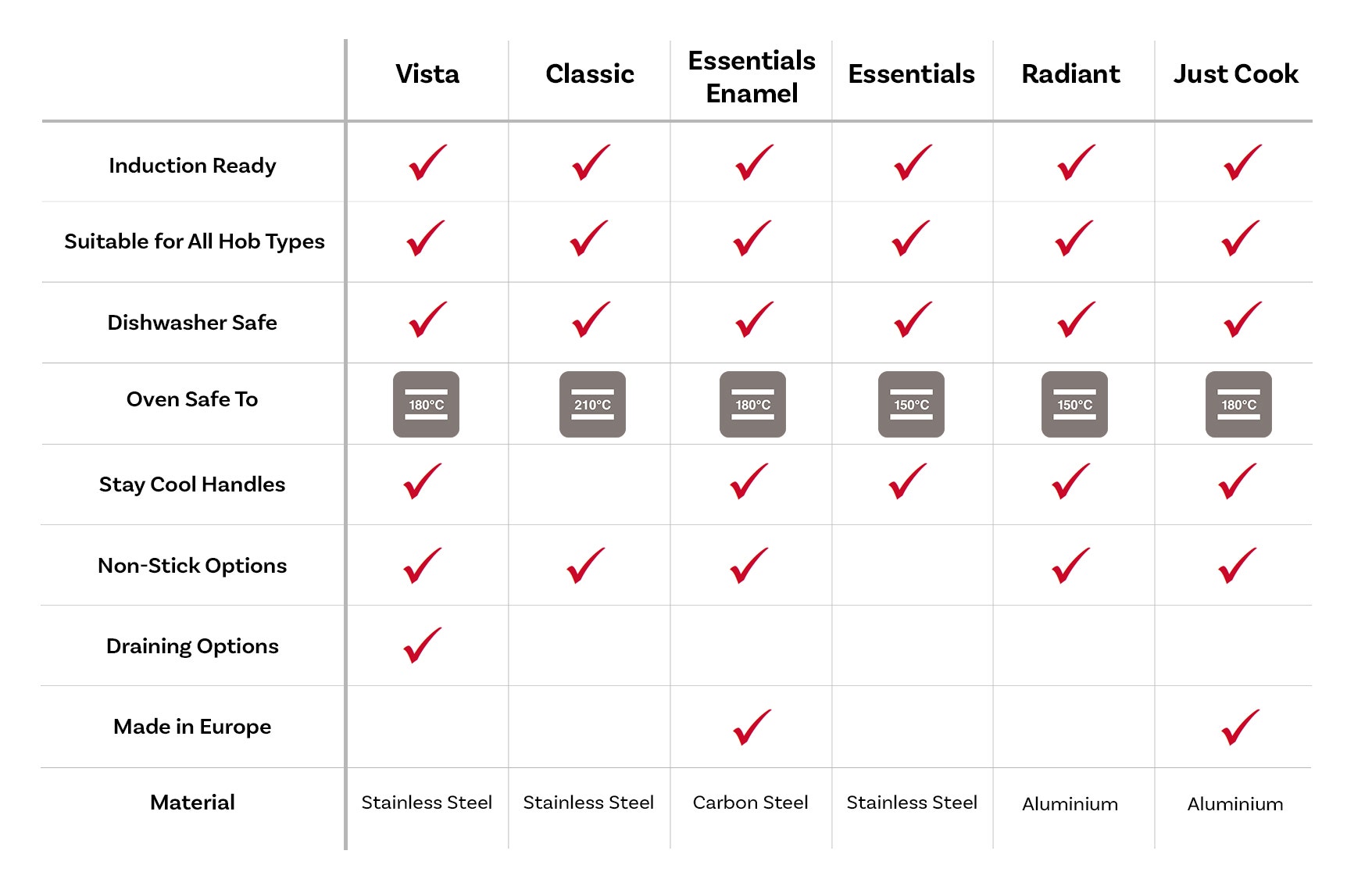Selecting new cookware is a very personal decision influenced by both design and function. Putting aside aesthetics, the following may help you select the one that best meets your needs.


What type of hob do you have?
- Gas – everything will work on gas, which is very fast and efficient. The only thing to be mindful of is the amount of heat that can come out from under the pan. This could make the handles hot or even damage them.
- Electric Radiant Ring & Solid Hot Plate (Solid Fuel or Electric) – as with gas all cookware will work but the heavier pans with flatter bases will be more efficient.
- Ceramic – A ceramic hob is a sheet of glass over electric heating elements. Again the heavier flatter pans will give the best performance. Also be mindful that uncoated aluminium bases may mark the glass of the hob. If this should happen there are specialist cleaners for ceramic hobs available from supermarkets and high street outlets.
- Halogen – Although similar to ceramic this hob uses a halogen heat lamp below the glass instead of a heating element. Again heavy base pans are best but also be careful that the base is not shiny as this will reflect heat back from the lamp reducing the efficiency. Most pans even stainless steel ones have a matt finish on the base for this reason.
- Induction – Similar in appearance to ceramic but employs a magnetic field to heat the pan rather than the surface of the hob. They are very fast and efficient with the added safety feature that the hob remains cooler which in turns means fewer burnt on deposits. For induction extra care is required in selecting your cookware as only certain pans will work. The following are suitable; cast iron & Enamel on Steel. Others can be made suitable for induction provided they have a special base or disc fitted e.g. stainless steel, aluminium, hard anodised. In our ranges if it is suitable for induction we say ‘Suitable for ALL hobs’.
Different materials that cookware can be made from:
- Stainless steel – is durable and hardwearing but a relatively poor conductor of heat so will have a disc of another material like aluminium hidden or fully encapsulated to overcome this problem. The best stainless steel for cookware is 18/10. This refers to the chrome and nickel content i.e. 18% chrome and 10% nickel which gives the optimum rust and stain resistance.
- Aluminium – excellent for cookware in that it is a good conductor of heat however it is relatively soft and will not last as long as stainless steel. Uncoated aluminium is very rare these days and will not work efficiently on ceramic or halogen hobs. Nowadays it commonly has a non-stick interior and either a paint or enamel coloured exterior.
- Hard Anodised – is aluminium that has undergone a special electro chemical process which makes the outside much harder. In fact it is said to be harder than stainless steel. The interiors are normally coated with a non-stick coating to prevent food sticking.
- Cast Iron – traditionally associated with solid fuel cookers like Aga’s and Rayburns and well suited to this type of cooking as the thick heavy material is slow to heat up and retains the heat for a long time after the heat source is turned off. i.e. good for long slow cooking.
- Enamel on Steel – is steel with a coloured enamel coating. This coating is either inside and out or just outside with a non-stick interior. Being thinner than cast iron it heats up more quickly but also will cool down more quickly. Being made from ferrous steel makes them excellent on induction.
To find the perfect cookware range that suits your cooking needs and hob type, browse our extensive cookware collection.